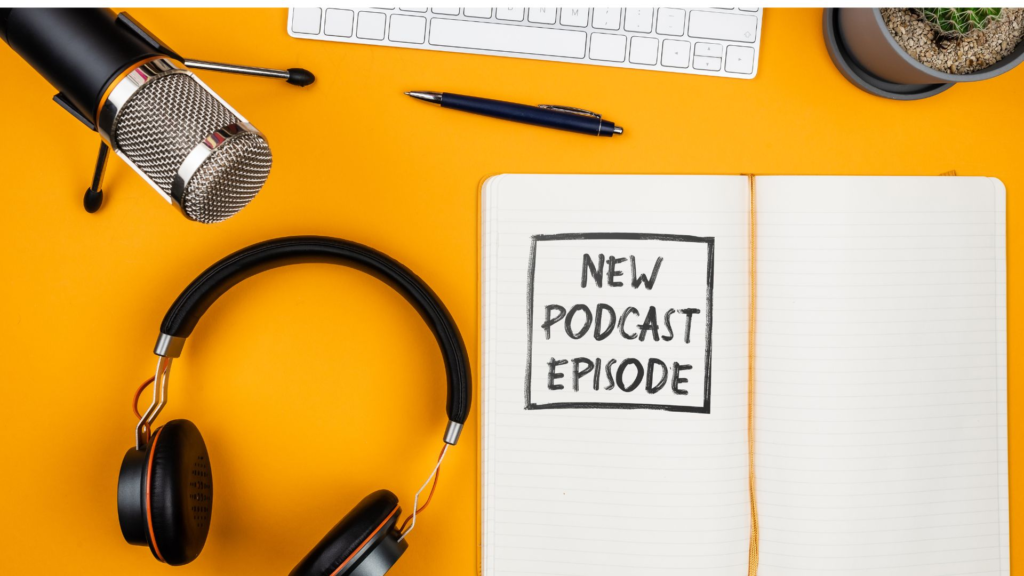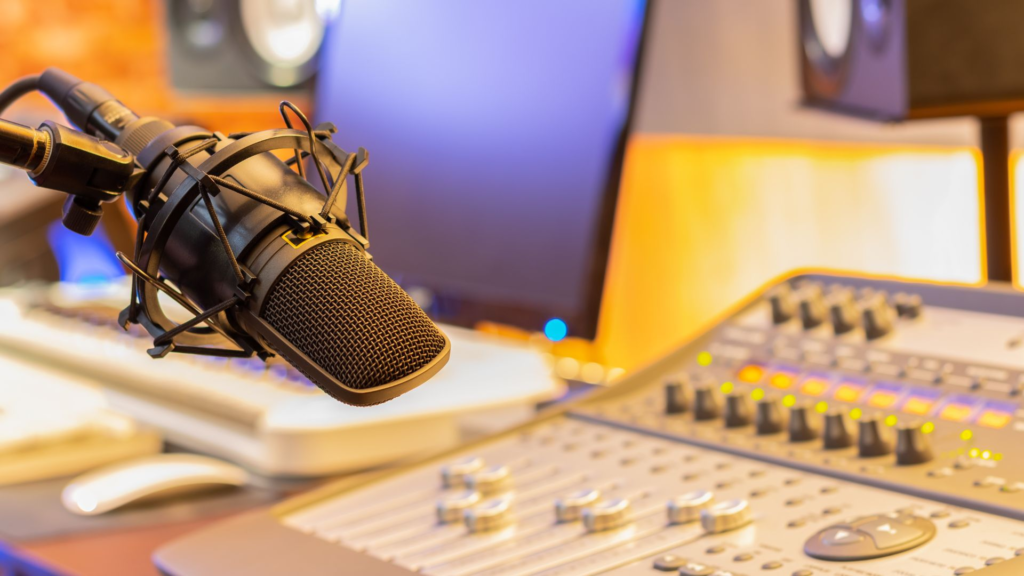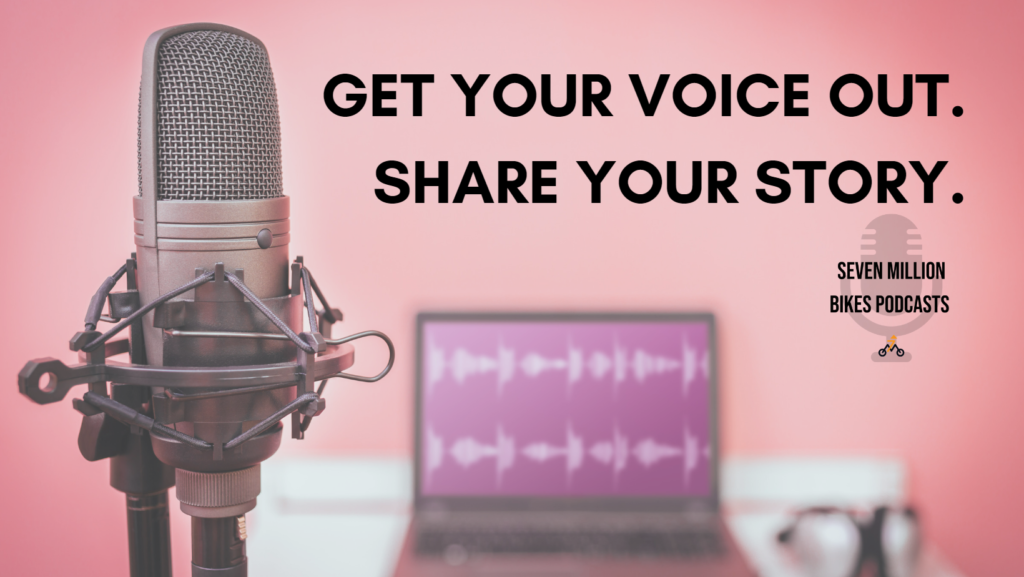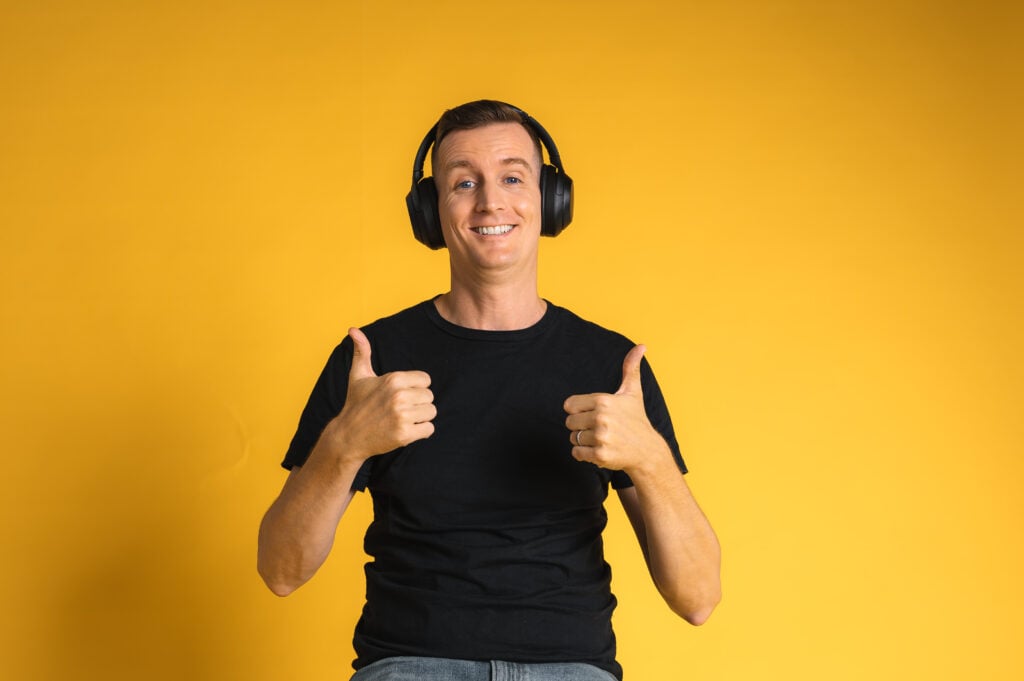Contents
What Is A Podcast?
The simple, plain answer to what is a podcast, is audio content on any topic that you can subscribe to on any computer or mobile device. Then listen to it whenever you like on a podcast app or podcast website.
The Cambridge dictionary definition is “a radio program that is stored in a digital form that you can download from the internet and play on a computer or on an MP3.” (This definition definitely needs an update – who even uses an MP3 player for music let alone downloads podcasts?)
It is like radio — But a lot better, convenient, diverse, and overall superb. This is why many radio shows then republish their show as a podcast! I’m here to unfold the definition of a podcast, popular types, and, of course, the viability of starting one! So budding podcast creators keep on reading to find out what is a podcast…
Find out why I started a podcast.

Should I Start My Own Show?
Now you know what is a podcast… you may be thinking of starting your own podcast, but are unsure where to start. Or even why to start. And don’t worry if you don’t know what RSS feeds are yet!
I still barely know what it is and you can start and build your podcast without ever knowing what is an RSS feed. But first, let’s make you know what is a podcast.
Podcast insights show that while podcast listenership is increasing every month, with Edison research showing that now nearly two-thirds of Americans have listened to a podcast, there are still only around 250,000 episodes published each week.
Compare this to 4.4 million blog posts a day!


But a podcast is much more than a blog – it can be a talk radio style show, a Ted Talk, made by National Public Radio, a digital music show, a sports show, even fiction podcasts are growing now in popularity thanks to shows like acclaimed audio drama Homecoming*. Your podcast can be about anything.
Just don’t make a podcast about anything though, choose a niche. It’s another thing you need to know on how to start a podcast.
The easiest and quickest way I explain to someone who has no idea what podcast episodes and podcast series are is to say,
You know radio stations? It’s kinda like that, but on the internet. But you can listen to podcasts or a podcast episode or podcast series wherever and whenever you want.
Niall Mackay
Much better than the Cambridge Dictionary! A podcast is not just a digital audio file uploaded anywhere on the internet or on podcast websites. Podcast listeners have to subscribe to podcast directories like Spotify or Apple Podcasts to listen to their favorite podcast hosts’ episodes.
*If you haven’t listened to Homecoming yet, listen to it now on your podcast app.
Podcast Structure
Now that know that audio files are not automatically podcast episodes until they are published on a podcast directory, podcasts have their own structure to set up too. One audio file or recording counts as one podcast episode, whereas a series of audio builds up the podcast series which makes up the podcast. Each episode can be on a different topic, or each episode can tell a compelling story that makes up the season.
Think of it as episodes are each chapter of a book that eventually completes your favorite novel. Speaking of novels, did you know that there are fantasy podcasts, too? Like these podcasts about Harry Potter! Podcast genres are growing exponentially, which I also discuss in my latest blog about “why podcasts are popular”.

What Are The Different Types Of Podcasts?
Audio Versus Video
An audio podcast consists of an audio recording of a conversation, interview, lecture, or other type of content that is typically distributed online via podcast directories and podcast hosting platforms. Audio podcasts can be listened to on various devices such as smartphones, tablets, and computers.
On the other hand, a video podcast (also known as a vlog, vodcast, or vidcast) is a podcast that includes video content as well as audio. The visuals can be recorded in various formats, including a talking head format, screen capture, or a combination of both.
It can be distributed online through podcast directories and platforms, as well as on video streaming services like YouTube. The main difference between an audio podcast and a video podcast is that the former only includes audio content, while the latter includes both sound and video files, and audio. Video may also be more visually engaging but requires more production time and resources than audio podcasts.
Additionally, the video may offer additional opportunities for monetization through advertising or sponsorships, as well as the ability to reach a wider audience through platforms like YouTube.

Audio Podcast

The most well-known type is the audio podcast, of course. This is simply an audio file similar to a radio broadcast that can be downloaded and listened to on any smart device.
Audio podcasts typically consist of a series of audio episodes, which can range from a few minutes to several hours in length, and most podcasts are created on a single topic, such as sports, beer, music, hunting, comedy, or any topic that someone is passionate about like Harry Potter or Vietnam.
When you subscribe to a podcast feed using a podcast app or website, it can automatically download new episodes as they become available if you choose this option.
Video Podcasts
I can’t say this any louder. If your content is only available on YouTube it is NOT a podcast. If your podcast is available on podcast directories like Apple Podcasts and Spotify AND also available on YouTube then it is a podcast.
This can be a divisive issue with many views on each side but this is my opinion and I’m happy to argue the point on this with anyone who disagrees. “YouTube podcasts” are becoming increasingly popular though as another channel to reach your target audience and grow. Spotify has now integrated video into their app so you can watch popular podcasts such as Diary of A CEO on the app, but in lower resolution than YouTube.
YouTube has also just announced in early 2023 that they will now add audio podcasts to the platform. This means that you can listen to your favorite podcasts and podcast episodes with the screen lock on without having to pay for YouTube Premium.
If you do add a video element creating it could be as straightforward or complex as you like.

A single static image or a video recording of the entire podcast with hosts and guests is the most straightforward and cheap, but you can also add multiple cameras and angles which will add to the complexity and cost of editing.
Audiobooks
Are Audiobooks Podcasts?
No, audiobooks and podcasts are not the same things. An audiobook is a recorded version of a book, usually read by a professional narrator. Now even with AI. It is a complete and unabridged version of the original book, typically available for purchase as a standalone product. A podcast, on the other hand, is an audio or video series that is regularly released online, usually for free.
While audiobooks and podcasts share the commonality of being audio-based, they have distinct differences in terms of their content, structure, and distribution. Audiobooks are typically longer and more focused on a single topic or narrative, while podcasts can vary in length and cover a broader range of subjects. Additionally, podcasts are usually released in episodes, whereas audiobooks are released as a single, complete work.

What Does ‘Pod’ In Podcast Stand For?
Fun fact: It is a mixed name. Podcast originally was a made-up combination of iPod and Broadcast, which then became a podcast.
Why iPod? Initially, public radio networks such as BBC, CBC, and NPR uploaded many of their radio shows on iTunes that could then be downloaded on an iPod. Hence, why many people talk about podcast episode downloads when nearly all episodes are actually streamed now.
This created massive convenience for listeners to listen to the news on mobile devices, and shortly after, other big news companies jumped in, like Financial Times and Bloomberg Radio. Then Ricky Gervais came along with Stephen Merchant and Karl Pilkington starting a phenomenon that was picked up and re-energized by the Serial podcast about Adnan Sayed.
So, if big corporations, news outlets, and celebrities used podcasts to spread information, how did it become so viable for small companies to solo entrepreneurs to create theirs?
Because the barrier to entry is low for podcasting, anyone with a microphone and basic editing skills could start one. While this is still true, the bar has risen considerably higher as podcasts have become more mainstream, and poor quality audio files and a rambling host talking about everything and anything don’t cut it anymore.
Are Podcasts Viable?
The short answer is YES. Podcasting is a viable marketing channel.
A podcast is viable for any business or organization growing massively and is an effective marketing tool for building a solid audience.
You may be thinking this whole podcasting business isn’t going to work out if BBC, NPR, Joe Rogan, and Prince Harry have already leveraged it. And now you know what is a podcast you may be worried you don’t have all the access to fancy podcasting microphones, equipment, and podcast editing software like Descript.

My good news is, you don’t need all of these first. To create a viable podcast for any business or solo entrepreneur, you need 3 things:
- A voice
- An idea
- A recorder
Grab your smartphone and start interviewing exciting people in your chosen podcast topic or start developing your story. Then all you need to do is upload your podcast to any podcast hosting service that I mentioned initially.
Creating a podcast can step up your business, build your audience, and create new networks. If you are ready to take your first step in creating your own podcast but need more helo still, check out my podcast course.

Should I Start My Podcast?
Yes! But, if you are thinking about starting a podcast, there are a few things to consider. Before you even start recording, you’ll need to determine your topic and target audience. What do you want to talk about, and who do you want to reach? Once you have a clear idea of your audience, you’ll need to invest in at least some equipment, such as a microphone, recording software, and editing software to start.

Importantly, you should also think about the time commitment required to produce a podcast. Depending on the frequency and length of your podcast episodes, you may need to dedicate several hours each week to recording, editing, and promoting your podcast content. Finally, once you’ve uploaded the audio files to your hosting platform you’ll need to consider how you plan to distribute your podcast episodes (Apple Podcasts is not the only podcast directory – get on all of them!), whether through email, social media, or other channels.
Overall, starting a podcast can be an incredibly rewarding experience, but it requires a significant investment of time and effort. If you have a passion for a particular topic and are willing to put in the work, a podcast can be a great way to share your ideas and connect with others who share your interests.
Starting a podcast was the best decision I have ever made and changed my life for the better. It will not only open a whole new world for you, but you will also learn valuable new skills and meet amazing people along the way.
Since I started podcasting I now do stand-up comedy, voiceovers and even acting! None of this would have been possible if I hadn’t started my podcast. Join me on the podcasting journey with my podcast course ‘How to get your voice out & share your story’, a comprehensive guide taking you step by step from a podcast beginner to an expert in one week.



